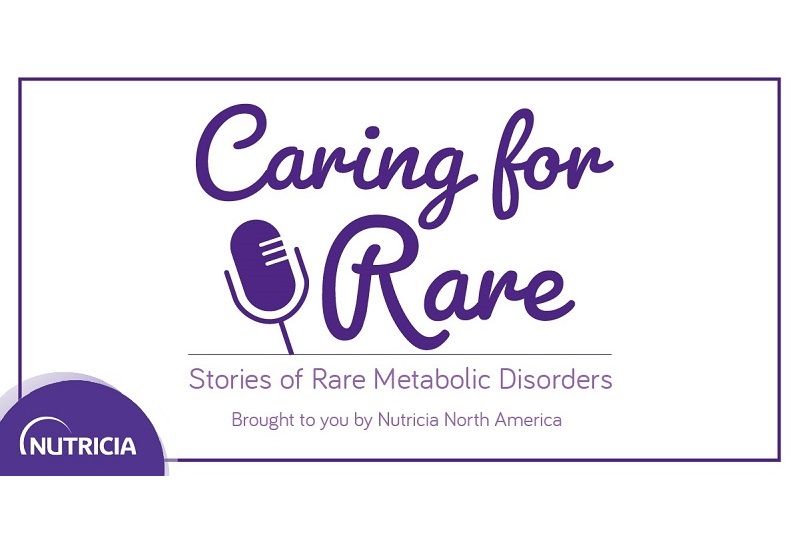
Parents of children and children with PKU, MSUD and HCU share how they talk about their metabolic disorder
Nutricia North America’s podcast – Caring for Rare – explores what life is like with a rare metabolic disorder such as phenylketonuria (PKU), maple syrup urine disease (MSUD), and homocystinuria (HCU). Episodes feature families’ personal stories of inborn errors of metabolism. Our guests on the show share their difficulties at diagnosis, changes they made to adapt to condition management, everyday joys, and more.
Though these disorders are rare, it is possible to find community and support. We hope you’ll feel comfort and connection in the stories of Caring for Rare.
Note: the interviews and anecdotes featured in these podcast episodes may not be representative of all rare metabolic disorders, and this podcast in no way replaces the guidance and supervision of metabolic healthcare professionals. Always consult your metabolic healthcare team prior to making any changes to diet or condition management. Guests on Caring for Rare are compensated for their time.
Listen now to Julie, Lacy, Jordann, Andre, Cole and Sarah as they share how they talk to their kids about their metabolic disorder
Caring For Rare is also available on Apple, Google Podcast, Amazon Music and other podcast hubs!
How do you talk to your kid about their metabolic disorder? How do you address having to get blood draws, a different diet and food choices and explain why their circumstances may be different to another child? Listen as our guest parents and their kids share how they deal with such issues in their own way.
Here are a few excerpts of our conversations with the families in Episode 5, Season 1 of Caring for Rare:
SARAH: It’s always in the back of your mind, that they have these limitations, but we do our best to lead a normal life. Another family suggested that book to us called Everybody Has Something. Our kids read it frequently and we do reference it quite a bit in our approach on this is with the kids as we talk and we grow, is that everybody has something. You can’t always see it on the surface. There’s everybody has something going on. The other thing that we try to instill in the kids is: You can’t use this as an excuse, it’s not a crutch, you know, you have to work hard in school. Everybody works hard in school. You can’t use HCU as a reason you’re not doing well. That’s not a reason to get a pass. So we are working with them on the mental aspect of that.
JORDANN: Carter, if somebody were to ask you what is MSUD, what would you tell them?
CARTER: I’d say it’s like this thing that it’s going to be fine, you can’t have certain food,
JORDANN: Why can you not have certain foods?
CARTER: Because it can damage your brain and I could die. But being a kid with MSUD is normal. You can’t have certain food, but like you can do lots of other stuff.
JULIE: And I think it gets really hard when they get older and they start asking questions like, why do I have PKU, why doesn’t David have PKU? And we’ve just said, like, God gave this to you for a special reason. We don’t know why, but it’s for a reason. And you’ll figure it out one day. And we do know that David’s a gene carrier. So we said to him, like, we’re really honest about the science, like, well, mommy, daddy and David are gene carriers and you have two genes. And then he’ll be like, well, why did I get two, and you go into the whole explanation again. But we have noticed that he can handle much more than we want to protect him from.
LACY: I like that avenue. I’m definitely going to write that down. My husband, Darryl, would not want to tell Aspen that something happened, that he’d say it was too spicy. And I’m like, it’s time we stop lying to her. She can’t have it because it’s too much protein, because what happens when she’s five and thinks she can handle the spice? You know, it’s just unfortunately, I think we need to start head on with it. So she will tell me things like too much protein. Do I think she gets it completely? No, but we’re getting there, I believe.
Listen to the full episode to hear more about how these families talk about their metabolic disorder. You can find Caring for Rare on our website, as well as on Spotify, Apple, and other podcast hubs. Stay tuned for more Caring for Rare episodes!
Caring for Rare: Stories of Rare Metabolic Disorders is brought to you by Nutricia North America. It was produced by Alletta Cooper, Ulrike Reichert, and Kate Miley. Transcript available here.
Always consult your metabolic healthcare professional team prior to making any changes to diet or condition management.
© 2022 Nutricia North America
